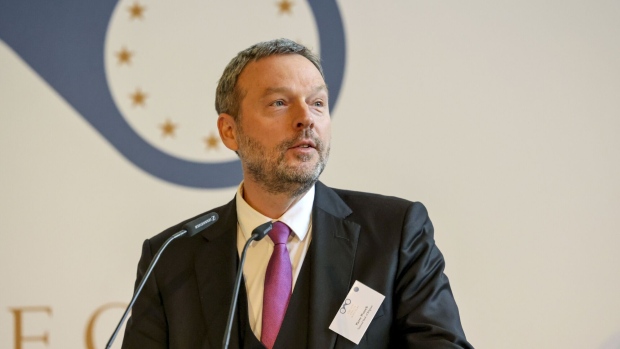Apr 19, 2024
ECB’s Wunsch Says Decisions Will Become Tougher After Two Cuts
, Bloomberg News

(Bloomberg) -- The European Central Bank has a clear case to lower interest rates twice, but what happens after that is difficult to predict because of uncertainty over domestic inflation pressures, Governing Council member Pierre Wunsch said.
Slower inflation means the current level of borrowing costs is becoming more restrictive in real terms, the Belgian central-bank governor said in an interview in Washington, where he’s attending the International Monetary Fund and World Bank spring meetings.
“That speaks in favor of at least removing parts of this additional restriction,” Wunsch said. “Without negative surprises, the first two rate cuts are quite easy and then it becomes a bit more complicated.”
ECB officials appear to agree on the need for an initial reduction in June unless major surprises derail the inflation outlook. Only few predict how many moves will follow this year, as officials face uncertainties ranging from delayed easing by the Federal Reserve to Middle East tensions and sticky services prices at home.
Wunsch said the ECB’s July meeting will offer important insight on the road ahead.
“If we see some inertia in wage developments and services inflation, we’re not going to want to signal that we are going to cut at every meeting,” he said. “The July decision will probably give an important signal about the pace of rate cuts. And that’s where I really don’t want to give any indications. Because honestly, I don’t know.”
Fighting between Israel and Iran has become the latest source of anxiety, especially since Russia’s attack on Ukraine and the ensuing surge in natural gas prices were responsible for much of the euro zone’s inflation wave of the last two years. For Wunsch, a significant increase in oil costs would have a direct impact on ECB policy.
“You don’t look through an oil shock if core inflation is at 3%, services inflation is at 4% and wages are rising by 4%,” he said. “I’m not saying we’re going to hike again. But that would have an impact on the timing of rate cuts, for sure.”
However, “it all depends on the kind of oil-price shock,” he said.
Another twist has come in the form of disappointing inflation data in the US that’s raising the question of whether the Fed can cut at all. It had previously looked set to start loosening in June — the same month as the ECB.
Views in the ECB diverge on how much of an impact that would have on monetary policy in the euro zone. Wunsch acknowledged that disconnecting from the rates trajectory in the US will leave a mark.
“The net impact is higher inflation in Europe,” he said. “The upward impact of the exchange rate, a stronger US economy and a common component in global inflation will outweigh the downward impact of higher long-term bond yields, I believe. In theory not to the extent that we can’t cut rates, but directionally for sure.”
©2024 Bloomberg L.P.






